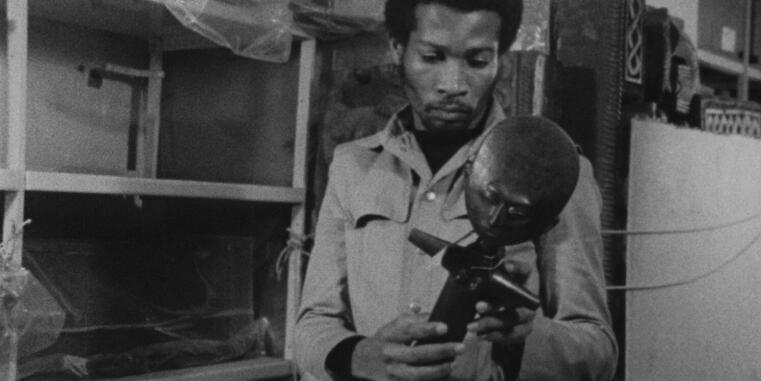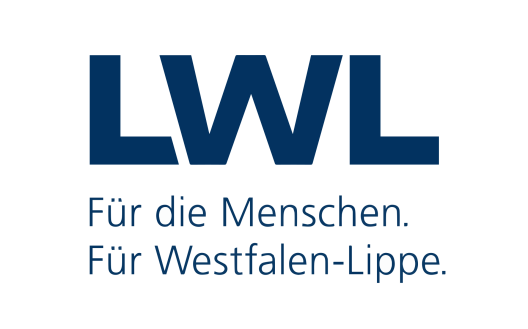

What does it mean when a piece of history is missing, when cultural identity has been stolen? The film series “Access and Return: Restitution in Films” looks at where objects are absent – and invites us to understand restitution not only as a gesture of reparation, but also as a social challenge.
Idea & concept: Maria Engelskirchen, Corinna Kühn, Daniel Müller Hofstede
The film series was a cooperation with the LWL-Museum für Kunst und Kultur.
In recent years, the issue of the restitution of colonially looted cultural assets has increasingly moved into the public consciousness. For a long time, the demands of many communities of origin were ignored at a political level. They also often fell on deaf ears in society at large. Since the 1970s, however, filmmakers have been addressing the imbalance between the absence of important objects in their contexts of origin and the depots in European museums filled with artefacts from the Global South. They document the effects of denied access to cultural heritage, but also the artistic and political resistance against it.
The film series was dedicated to the struggle for cultural self-determination, dealing with continuing colonial power relations and the question of what restitution means and can mean today. On three evenings, selected essay and documentary films as well as short formats were shown that categorise the topic both historically and shed light on current perspectives. While the Afro-Caribbean author Aimé Césaire stated as early as 1950 that colonial violence “cannot be disposed of so cheaply”, the films impressively demonstrate that restitution requires more than the return of objects. It requires a profound change of perspective - away from Western interpretations and towards the voices and perspectives of the societies of origin. The film series invites us to reflect on responsibility, origin and the facilitation of new approaches. It asks what ways of listening, recognising and making amends can look like – because without them, restitution remains incomplete.
Part 1: Restitution as an act of recognition (Tuesday, 17 June 2025, 7 pm)
Introduction: Jolanda Saal (Centre for Advanced Study “Access to Cultural Goods in Digital Change”)
YOU HIDE ME, Nii Kwate Owoo, 1970, 17 min. [English OV]
DAHOMEY, Mati Diop, 2024, 68 min. [English/Fon/French OV with German subtitles]
YOU HIDE ME by Ghanaian filmmaker Nii Kwate Owoo succinctly demonstrates that today's restitution debate could have started much earlier. From today's perspective, it becomes clear how vehemently demands for restitution from countries of the global South were (culturally) politically and socially rebuffed. In the early 1970s, the film follows a man and a woman into the depots of the British Museum in London and discovers African cultural artefacts wrapped in plastic or stowed in wooden crates that have not only been stolen from their original owners, but have not even been unpacked. Owoo raises questions about expertise, access and justice and demands the return of the objects. In DAHOMEY by Mati Diop, the return of 26 treasures from the Kingdom of Dahomey from France to present-day Benin is actually realised over fifty years later. The object with the number 26, a statue of King Ghézo, has a voice in the film itself: via voiceover, the object tells us, mostly from its transport crate and with the distorted voice of Haitian writer Makenzy Orcel, how it felt in the cellars of the Musée du Quai Branly and what memories and thoughts arise with its imminent return. A discussion held by students from the Université d'Abomey-Calavi in the south of the country at the end of the film shows that not all questions have been answered and that the symbolic political function of restitution is viewed critically. The question of the extent to which restitution can be a serious act of recognition and what changes in thinking and behaviour are necessary for this is only the beginning of a long-term process.
Part 2: Opposing voices and rhythms of resistance (Tuesday, 24 June 2025, 7 pm)
Introduction: Maria Engelskirchen und Corinna Kühn (Centre for Advanced Study “Access to Cultural Goods in Digital Change”)
OBJECT ID, Pauline Hafsia M'barek, 2012, 6 min. [English OV]
UNEARTHING. IN CONVERSATION, Belinda Kazeem-Kamiński, 2017, 13 min. [English OV]
UN-DOCUMENTED: UNLEARNING IMPERIAL PLUNDER I, Ariella Aïsha Azoulay, 2019, 36 min. [English OV with English subtitles]
ONE HUNDRED STEPS, Bárbara Wagner & Benjamin de Burca, 2021, 32 min. [Arabic/English/Gaelic/French/Occitan OV with German subtitles]
How are objects recorded, named, classified, categorised, stored, exhibited and communicated? What does this do to the objects, what does it mean for the societies of origin and today's reception? While Pauline Hafsia M'barek uses 55 questions in OBJECT ID to illustrate the scientific systematisation processes of museum inventories, in which the object itself largely remains a blank space, Belinda Kazeem-Kamiński's short film examines new ways of dealing with photographs and archival materials from colonial contexts. In UNEARTHING. IN CONVERSATION, the artist enters into a dialogue with historical photographic images from today's Democratic Republic of Congo and presents various methodological approaches to artistic research that enable a change of perspective on the histories of violence and traumas of colonialism sedimented in the photographs. Ariella Aïsha Azoulay's film UN-DOCUMENTED: UNLEARNING IMPERIAL PLUNDER interweaves the migration movements of objects and people and places the mechanisms of imperial collection on the one hand and the rigorous regulation of migration on the other in the context of persistent asymmetrical power structures. The polyphony lent to the script by the voices of three artists continues in ONE HUNDRED STEPS by Bárbara Wagner and Benjamin de Burca. The opulent interiors of two estates in Ireland and Marseille form the setting in which various performers use musical, vocal and dance interpretations to contrast their practice of immaterial cultural heritage with the stately spaces. As a subversive swan song to the world view associated with these representative architectures, the film draws on The Atlantean Trilogy (1980-84) by Irish filmmaker Bob Quinn to establish other lines of connection between cultures beyond national borders, mediated across the Atlantic.
Part 3: Reparative Practices of Remembering (Tuesday, 1 July 2025, 7 pm)
Introduction: Sam Hopkins (Academy of Media Arts Cologne)
MBARODI, Mamadou Khouma Gueye, 2024, 21 min. [Wolof OV with English subtitles]
CRACKS IN THE MASK, Frances Calvert, 1997, 57 min. [English OV]
What effects does the absence of cultural goods have on the transmission of knowledge, artistic skills and cultural practices? What alienation from social life are objects confronted with after their return and how can this be countered? The two films of the evening explore these questions in different ways. MBARODI by Mamadou Khouma Gueye refers to the tradition of the simb or faux lion in Senegal, popular dance performances in urban spaces in which the performers embodying the lions display their strength and masculinity. In contrast to this public demonstration of strength and dancing skills, it is moments of stillness, concentration, but also restlessness and exhaustion that bring us closer to the protagonists: during careful make-up, in the museum, in the hustle and bustle at night and in dialogue with a caring friend. In this way, the film focuses on reparative gestures of care that can reshape relationships with the objects. CRACKS IN THE MASK by Frances Calvert reverses the ethnographic gaze and accompanies a couple from the Torres Strait Islands in the mid-1990s to various European museums in search of material evidence of their culture. Exhibition displays, museum depots and conversations with curators are interwoven with historical anthropological film and sound recordings and flanked by the travellers' diary entries. Almost three decades later, the reflections have lost none of their topicality, while some of the arguments expressed in the film in favour of the objects remaining in Europe sound familiar because they are bitterly echoed in today's debates. Nevertheless, the film is a sign of hope: despite the spatial and temporal distance and many institutional and political obstacles, it pleads for the rift to be repaired and the broken connection to be resumed.
The auditorium has an induction loop for guests with hearing aids with a T-coil.

We would like to thank the artists and filmmakers as well as the distributors. We would like to thank the Evangelisches Zentrum für entwicklungsbezogene Filmarbeit (EZEF) for their kind permission to screen CRACKS IN THE MASK.
The event is organised in cooperation with the LWL-Museum für Kunst und Kultur.

